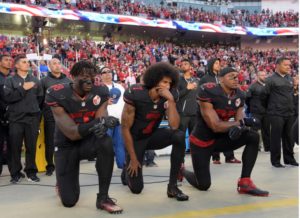Tag: Does Colin Kaepernick Have A First Amendment Case Against Donald Trump?
Does Colin Kaepernick Have A First Amendment Case Against Donald Trump?

If his collusion case against the NFL and its team owners fails, former San Francisco 49ers quarterback Colin Kaepernick, allegedly blacklisted by the league for his decision to kneel in protest during the national anthem, may have another legal recourse: suing President Donald Trump and the NFL for violating his First Amendment rights.
Trump has spent much of the past year trashing the protests of predominantly black players to the delight of his political base. He has repeatedly called on NFL owners to prohibit players from protesting. Last September, he used a campaign rally in Alabama to urge the team owners to fire any “son of a bitch” player who protested.
Trump’s demagoguery has had an obvious effect on the NFL and its owners, who in May approved a new policy that requires players to stand for the national anthem if they are on the field before games. Trump has continued to wield the issue since: on Monday, he blamed anthem protests for his abrupt cancellation of the Super Bowl champion Philadelphia Eagles’ Tuesday visit to the White House, even though no members of the team knelt during the 2017 regular season.
But Trump’s actions, some legal experts argue, may also have opened him up to claims that he and the NFL violated the players’ First Amendment rights to free speech and peaceful protest, especially if his threats against the league helped force owners to institute the new policy or influenced their treatment of protesting players.
“It’s a very bold step to sue the United States based upon alleged wrongdoing of the sitting president, and filing such a claim might make a player such as Colin Kaepernick into an even more polarizing figure,” said Marc Edelman, a law professor at City University of New York’s Baruch College. “However, based upon the pure black-letter law, a [First Amendment] claim of this nature may have a reasonable chance to succeed.”
As every graduate of YouTube Comment Law School knows, the First Amendment typically protects individuals only when the government, or a government official, infringes upon their free speech rights. NFL teams and their owners are private actors and thus are free to do as they wish, at least with respect to the First Amendment.
But in certain cases, private businesses can be considered state actors, and Kaepernick and other NFL players ― like his former San Francisco teammate Eric Reid ― who appear to have been ostracized over their protests, could have a credible argument that the NFL, in this instance, was a public entity that was improperly influenced by the president.
The NFL, Edelman argued, could be considered a state actor for two reasons: First, because it receives tax breaks from the federal government, and second, because most of its teams play in stadiums that are partly financed by local governments. NFL stadiums have also received billions of dollars in federal tax subsidies.
Federal courts have previously ruled that sports franchises have acted as state actors. In 1978, a judge found that the New York Yankees’ policy banning female reporters from their locker room violated the Constitution’s Equal Protection Clause because New York City owned Yankee Stadium, qualifying the team as a state actor, as Edelman notes in a brief he wrote examining the possibility of NFL players filing a free speech lawsuit.
None of this would matter, however, were it not for Trump’s own actions ― and specifically his tweet in September suggesting that certain tax breaks be eliminated if the league didn’t start punishing the protesters.


